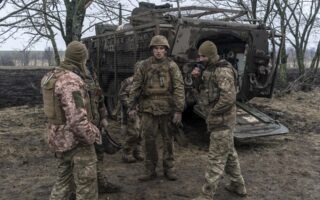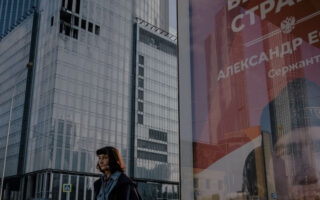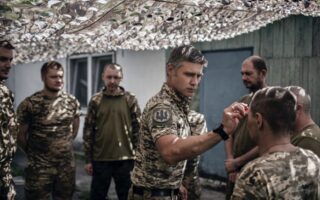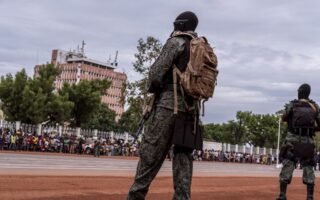‘Waiting for my time to come’: Ukraine’s new draft law unsettles the young
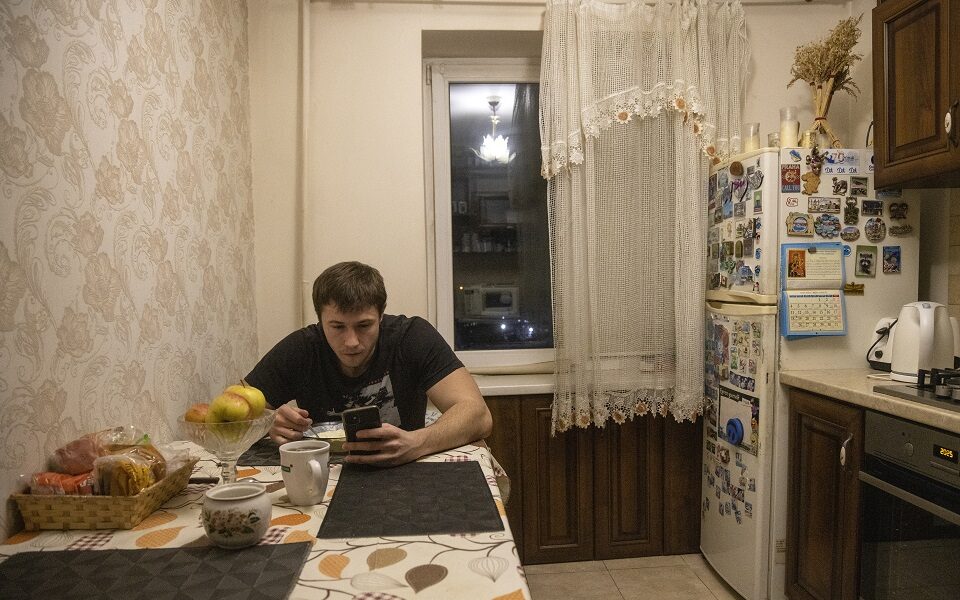
President Volodymyr Zelenskyy of Ukraine probably changed the fates of thousands of Ukrainian men when he signed a law lowering the draft age to 25 from 27 this month, more than two years after Russia began its full-scale invasion.
Ukrainian forces are struggling to hold back the far larger Russian army, and desperately need their ranks replenished. Now many of the young men who remain in Ukraine – thousands of others have illegally fled the country – worry about their future.
Reporters from The New York Times spoke to Ukrainian men who could be affected by the change.
‘I am worried, even a little scared’
Yegor Khomchenko, the owner of a communal bakery in eastern Ukraine who turns 25 next month, said he had many friends who had gone to war.
But he said that his wife, Amelia, had told him that she would “do everything possible to prevent me from being taken away” if he were to be drafted.
“I am worried, even a little scared,” Khomchenko said. “But everything will be as God intended.”
Khomchenko lives in Druzhkivka, an industrial town in the Donetsk region of eastern Ukraine. Russia has shelled the town with missiles and artillery, but life goes on, even though on most nights you can still hear the rumble of fighting on the front line nearby. At the beginning of the war, his wife, then pregnant, traveled to the central Ukraine city of Dnipro. She returned home after giving birth to their son.
“She feels quite calm here because our family is together. We can’t imagine living separately, and don’t know how people separated by war for months and years can cope with this ordeal,” he said. “Of course, when there is shelling in Druzhkivka, Amelia is scared, but we are strong together,” he added.
‘I was terrified at the thought of going to war’
Nestor Babskyi, 23, a physical therapist at a rehabilitation center in western Ukraine, sees several Ukrainian soldiers a day who have been wounded and maimed by the war. He said he felt guilt about not having served himself and a sense of dread for what lay ahead.
“At first,” Babskyi said, “I was terrified at the thought of going to war, but now I am calm about it.”
The wounded soldiers “have played their role and returned to live their lives, so I’m waiting for my time to come.” He added: “I realize that I will definitely be more useful there than here. This thought calms me down.”
‘Young people are the future’
Oleksandr Manchenko, 26, a journalist from Kharkiv, Ukraine’s second-largest city, who has covered the war, noted the tough calculation that Zelenskyy had probably faced in lowering the draft age.
“Young people are the future, no matter how trite it may sound,” Manchenko said.
“Perhaps he thought that Ukraine could do without mobilizing young people, but apparently the military situation does not allow us to have such a luxury,” he said.
Manchenko said he respected the bravery of those who enlisted in the early days of the war. “It is thanks to them that we survived,” he said, adding that he doubted his own courage and did not want to fight.
“Furthermore, I want to continue doing what I am doing because I think my work is also important,” he said. “But I’m not going to run away from mobilization and hide. So we’ll so how my fate unfolds.”
‘I need to be as professional as possible’
Maksym Sukhyi, 27, a dental technician in Ukraine’s capital, Kyiv, had already reached the minimum conscription age when the new law was signed April 3. He said he had been training to go to war since August 2022 but had yet to enlist.
He has been looking for a unit to join while learning about weapons and tactics at a camp on the weekends and going to the gym.
Training in Ukrainian military units is often uneven at best, and those men who are drafted – rather than the ones who join voluntarily – are often assigned to the infantry. Those ground troops usually pull the hardest duty: sitting in trenches under heavy shelling and attacking enemy lines if need be.
Sukhyi said he was bracing for such possibilities.
“I need to be as professional as possible. If I go to war, I also want to be a professional there,” he said. “Therefore, I prepare for possible mobilization as much as time and financial resources allow. If I end up at war, I don’t want to be someone who knows nothing.”
‘My parents are more worried’
Vasyl Vanzhurak, 24, is a sawmill worker in western Ukraine’s Carpathian Mountains. He said that he had wanted to enlist but his father went off to fight, leaving him to take care of his mother and other relatives in the war’s early months.
“Am I worried? Yes and no,” Vanzhurak said. “My parents are more worried about me going to the army than I am.”
He said he realized that with such a brutal war going on, “they still need people there.”
‘This war, unfortunately, will last a long time’
Denys Yemets, an electrician at a steel plant in southern Ukraine, turned 25 last month. He said he was not too worried about the change in the draft age since he believed he was needed more at the steel plant than in the army. But, if called up, he would go fight, he said.
“I’ve already gotten used to the idea that this war, unfortunately, will last a long time,” he said. “At first, we all hoped that it would be over quickly, but later it turned out that reality is much harsher.”
Yemets said that his uncle and stepfather, who had already fought in the war, had discouraged him from fighting. “They really did not want me to follow in their footsteps and serve in the army,” he said.
“I am the only male descendant left in the family, and they are very worried that I won’t be OK,” he said. “They would definitely want me to stay at the plant and continue to support my mother, aunt and grandmother.”
Generations of Ukrainians were upended when Russia invaded. As the war continues with no end in sight, Ukraine’s youngest are in increasing peril, at risk of being dragged toward the carnage of ground combat as they defend their homeland.
On the front lines, their fate will be decided by, as the English World War I poet Wilfred Owen once wrote, “chance’s strange arithmetic.”
This article originally appeared in The New York Times.

